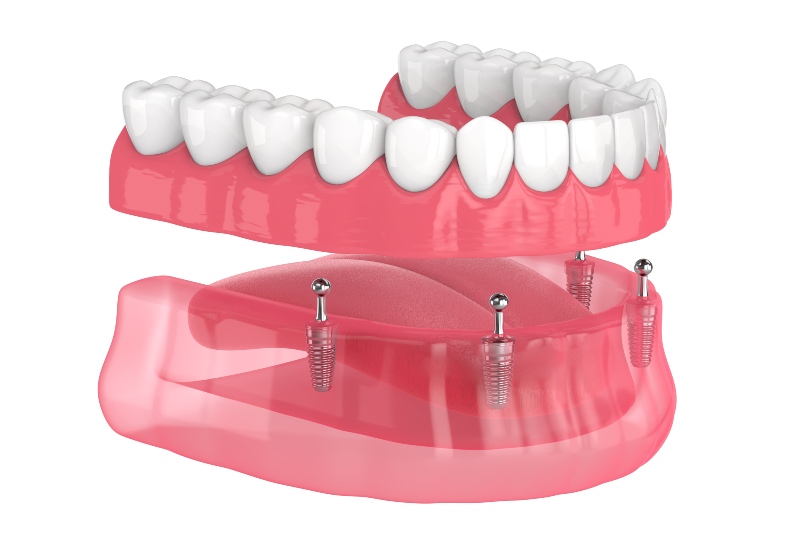How Many Dental Implants Do You Need for Implant-Supported Dentures?
How Many Implants Are Needed for Implant-Supported Dentures?
Missing multiple teeth can feel overwhelming, especially when you’re trying to figure out the best replacement option. Traditional dentures might slip around or make eating certain foods a challenge, leaving you wondering if there’s a better solution. That’s why implant-supported dentures are so popular. They offer the stability of dental implants with the comprehensive coverage of dentures. Hi-Tech Family Dentistry offers implant-supported dentures in the Southfield, MI area. Understanding how many implants you’ll need can help you understand whether this is the right solution for you.

What Exactly Are Implant-Supported Dentures?
Implant-supported dentures combine the best of both worlds: the security of dental implants with the full-mouth coverage of traditional dentures. Unlike conventional dentures that rest on your gums and rely on adhesives, these prosthetics anchor directly to titanium posts surgically placed in your jawbone. The implants act as artificial tooth roots, providing a solid foundation that prevents the embarrassing slips and uncomfortable movement many people experience with regular dentures.
How Many Implants Do You Need for Full Dentures?
The number of implants needed for full dentures typically ranges from four to eight implants per arch, though this varies based on the person. Many dentists consider the “All-on-4” concept for minimum implant support, which uses four strategically placed implants to support a full arch of teeth. Some patients benefit from six or eight implants per arch for enhanced stability and longevity. So, the vast majority of patients will need four or more implants. Your dentist will evaluate your bone density, jaw structure, and lifestyle factors to determine the optimal number of implants for your specific situation.
What Factors Determine Your Implant Count?
Several key factors influence how many implants you’ll need for successful denture support, and understanding these can help set realistic expectations for your treatment.
Your Jawbone Health Makes All the Difference
Bone density and volume in your jaw directly impact implant placement options. When you lose teeth, your jawbone begins to deteriorate over time, a process called resorption. Patients with sufficient bone density might need fewer implants because each one can bear more load, while those with compromised bone structure may require additional implants to distribute the pressure of chewing and daily life properly.
Upper vs. Lower Jaw Requirements Vary Significantly
Dental implants for lower dentures typically require fewer implants than upper dentures due to bone density differences. The lower jaw generally has denser bone that provides better implant stability, often allowing for successful treatment with just four implants. The upper jawbone tends to be softer and less dense, frequently requiring six to eight implants for optimal support of the prosthetic.
Your Lifestyle and Chewing Habits Matter
Active individuals who enjoy tough foods like steaks or crunchy vegetables may benefit from additional implants to handle increased chewing forces. Your dentist will discuss your dietary preferences and lifestyle to ensure your implant-supported dentures can withstand your daily activities without compromising function or comfort.

Jaw Size and Arch Length Play a Role
Larger dental arches naturally require more strategic implant placement to provide adequate support. Patients with wider smiles or longer jaw structures might need additional implants to prevent cantilever stress on the prosthetic, which could lead to complications over time.
What Are Your Implant Options for Dentures?
Different implant configurations offer varying levels of support and investment, allowing you to choose the option that best fits your needs and budget.
- All-on-4 Treatment: This popular approach uses four implants per arch positioned at specific angles to maximize bone contact and support. The angled placement often eliminates the need for bone grafting, making it a faster and more affordable option for many patients.
- All-on-6 Treatment: Six implants per arch provide enhanced stability and better force distribution, particularly beneficial for patients who want maximum chewing power or have concerns about long-term durability.
- All-on-8 Treatment: Eight implants offer the ultimate in stability and longevity, though this option requires adequate bone volume and represents a higher initial investment.
- Hybrid Options: Some patients benefit from combining different numbers of implants between upper and lower arches based on their specific bone conditions and functional needs.
Healing and Long-term Care Expectations
Recovery from full mouth dental implants typically takes three to six months, during which the implants integrate with your jawbone through a process called osseointegration. During this healing period, you’ll wear temporary dentures that allow you to eat soft foods and maintain your appearance. Once healing is complete, your final prosthetic is attached, providing years of reliable function with proper care. Regular dental visits, good oral hygiene, and avoiding harmful habits like smoking will help ensure your investment lasts for decades.
Schedule an Implant-Supported Denture Appointment Today!
Determining the right number of implants for your denture needs requires professional evaluation of your unique situation. Every mouth is different, and factors like bone density, lifestyle, and personal preferences all play important roles in treatment planning. Fixed dentures with implants can transform your quality of life, but the key is working with an experienced dental team that can guide you through the decision-making process. Schedule a consultation to discuss your specific needs and learn how implant-supported dentures can restore your confidence and oral function.
